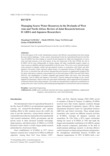Managing Scarce Water Resources in the Drylands of West Asia and North Africa: Review of Joint Research between ICARDA and Japanese Researchers
Japan Agricultural Research Quarterly
| ISSN | 00213551 |
|---|---|
| NII recode ID (NCID) | AA0068709X |

Full text
jarq55-5_511-519.pdf535.67 KB
In the arid regions of the world, maintaining economic and efficient crop production has been among the most critical challenges. In this context, International Center for Agricultural Research in the Dry Area (ICARDA) has been leading in research-for-development for improved management of scarce water and land resources in the arid regions. In the new framework of the One CGIAR, the role of ICARDA will be more indispensable as climate change will make considerable negative impact on water resource availability and land sustainability in the dry areas. This review covers selected research works pursued in irrigated, rainfed and agro-pastoral systems in cooperation with Tottori and other Japanese Universities which represent longest history of cooperation between ICARDA and Japan. The review is structured into sub-sections summarizing joint research on supplemental irrigation (SI) for wheat cultivation to optimize water productivity in semi-arid region of West Asia and North Africa (WANA), and rehabilitation of Jordan’s degraded agro-pastural lands with micro water harvesting technology. Joint ICARDA and Japanese Universities’ research enhanced knowledge on the various adaptation technologies’ effects on the soil-water-plant relationships, which supported the development of tailored solutions and scaling strategies. The results are internationally recognized as contributions to coping with scarce water resources and combating land degradation in arid and semi-arid environments.
| Date of issued | |
|---|---|
| Creator | Masafumi TAMURA Theib OWEIS Vinay NANGIA Stefan STROHMEIER |
| Subject | micro-catchment rainwater harvesting rangeland rehabilitation supplemental irrigation water productivity water yield relationship |
| Publisher | Japan International Research Center for Agricultural Sciences |
| Received Date | 2021-01-27 |
| Accepted Date | 2021-05-20 |
| Volume | 55 |
| 号 | Special Issue |
| spage | 511 |
| epage | 519 |
| Language | eng |
